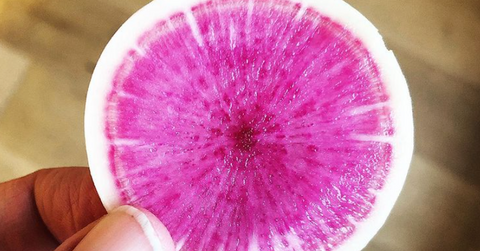Here's the Rundown on the Watermelon Radish
Updated Jan. 5 2021, 2:20 p.m. ET
The watermelon radish is kind of famous right now — people love that it’s a radish and a root vegetable, derived from the heirloom Chinese Daikon radish. Its sisters include: arugula, broccoli, and turnips, but none of those veggie-siblings even remotely resemble the watermelon radish. In fact, even a traditional radish doesn’t resemble the watermelon radish.
That’s because the watermelon radish resembles the fruit it's named after: the watermelon. With white and green skin, and a pink middle, the watermelon radish definitely could not be mistaken for a chunk of watermelon, but its uncanny resemblance is certainly quaint, adorable, and of course, Insta-worthy. Read up on watermelon radishes — how they taste, health benefits, and where you can find some for yourself.
Here's the run-down on the watermelon radish:
Despite its name, the watermelon radish doesn’t taste like watermelon — it simply gets its name from its physical appearance, also known as a likeness to the pink-and-green watermelon we all know and love. It has a slight kick — if you aren’t into spicy foods, it might not be for you. But, you can easily avoid the spicy part by composting the outside and eating the center, where it's sweetest.
As previously mentioned, watermelon radishes are root vegetables. Its leaves are high in vitamins, while their flesh is a good source of calcium, according to Organic Authority. Radishes also contain trace amounts of riboflavin, niacin, vitamin B-6, vitamin K, magnesium, zinc, phosphorous, copper, manganese, and sodium, according to Healthline. Radishes are also proven to lower blood pressure, fight cancer, and reduce stress, with potential links to gastrointestinal benefits. by preventing gastric ulcers and inflammation.
How to eat watermelon radishes:
When trying to eat sustainably, it’s always a good idea to eat what’s in season. Watermelon radishes are actually available year-round, but are technically in season throughout the winter and early spring seasons. For this reason, it’s best to buy watermelon radishes in the winter and early spring months. They’ll be the freshest and tastiest then.
The watermelon radish is especially sustainable because all its parts are completely edible — even the greens. They're bitter and some are fuzzy, which may make them undesirable to some people. But cooking the radishes (greens and all) can a) remove the fuzziness and b) de-bitter the greens’ flavor. However, watermelon radishes are typically used in salads, as garnishes, and on charcuterie and cheeseboards.
To add your watermelon radish to a salad, peel the radish and grate it. Watermelon radish pairs well in salads with carrot, cabbage, or other leafy greens like kale and arugula. To use as a garnish, slice it thinly and cut into a half-moon shape for an aesthetically pleasing and edible touch. You can also marinate them in a mixture of red wine vinegar and olive oil.
Watermelon radishes are spicy, but you can make them milder.
Watermelon radishes are kind of spicy, but if you can't handle the heat, you can still enjoy them with a simple trick. Slice the watermelon radish bulbs in half and soak them in ice water for 20 minutes. According to Rachel Ray, this will retain all the taste and flavor of the watermelon radish, just without the kick.
Alternatively, you could avoid the hottest part of the radish flesh (the outer rim) by cutting the radish and going for the center.
It should not be too difficult to locate watermelon radishes near you. Depending on the season, big grocery store chains like Whole Foods Market and Shop Rite can carry watermelon radish. Another good bet is your local farmer’s market, farm, or specialty produce store
